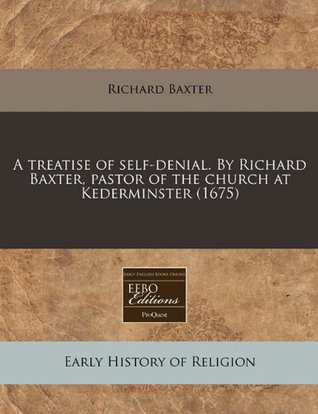- Bible
- Read the Bible
- Bible Versions
- Verse of the Day
- Reading Plans
- Verses by Topic
- Books of the Bible
- Bible Images
- Study
- Commentaries
- Concordances
- Dictionaries
- Encyclopedias
- Sermons
- Bible Atlas & Maps
- BP Wiki
- Devotionals
- Today's Devotionals
- Light of the World
- All Devotionals
- Inspirational Quotes
- More
- Picture Quotes
- Videos
- Inspirational
- Bible Study
- What The Bible Says
- Bible Q&As
- Daily Bread
- Bible by Genre
- Bible Stories
- Random Bible Verse
- Community
- Store
A Treatise of Self-Denial. by Richard Baxter, Pastor of the Church at Kederminster (1675)
by Richard Baxter
EARLY HISTORY OF RELIGION. Imagine holding history in your hands. Now you can. Digitally preserved and previously accessible only through libraries as Early English Books Online, this rare material is now available in single print editions. Thousands of books written between 1475 and 1700 can be delivered to your doorstep in individual volumes of high quality historical reproductions. From the beginning of recorded history we have looked to the heavens for inspiration and guidance. In these early religious documents, sermons, and pamphlets, we see the spiritual impact on the lives of both royalty and the commoner. We also get insights into a clergy that was growing ever more powerful as a political force. This is one of the world's largest collections of religious works of this type, revealing much about our interpretation of the modern church and spirituality.
++++
The below data was compiled from various identification fields in the bibliographic record of this title. This data is provided as an additional tool in helping to insure edition identification:
++++
A treatise of self-denial. By Richard Baxter, pastor of the church at KederminsterA treatise of self-denial. By Richard Baxter, pastor of the church at Kederminster
Baxter, Richard, 1615-1691.
[Edition statement: ] [Second edition].
Another edition of: Baxter, Richard. A treatise of self-denyall.
Edition statement from A2r caption title, "A premonition concerning this second edition."
"A dialogue of self-denial," [14] p. at end, with caption title on 2K2r.
With preliminary contents leaves: F3-F8.
[96], 417, [15] p.
London: printed by Robert White, for Nevil Simmons at the Princes Arms in Saint Pauls Church-yard,
Wing (2nd ed., 1994) / B1431
English
Reproduction of the original in the Bodleian Library
++++
This book represents an authentic reproduction of the text as printed by the original publisher. While we have attempted to accurately maintain the integrity of the original work, there are sometimes problems with the original work or the micro-film from which the books were digitized. This can result in errors in reproduction. Possible imperfections include missing and blurred pages, poor pictures, markings and other reproduction issues beyond our control. Because this work is culturally important, we have made it available as part of our commitment to protecting, preserving and promoting the world's literature.
BUY NOW
Paperback, 538 pages
Published December 13th 2010 by Eebo Editions, Proquest
© 2025 Bibleportal.com All rights reserved.

He wrote 168 or so separate works -- such treatises as the Christian Directory, the Methodus Theologiae Christianae, and the Catholic Theology, might each have represented the life's work of an ordinary man. His Breviate of the Life of Mrs Margaret Baxter records the virtues of his wife, and reveals Baxter's tenderness of nature. Without doubt, however, his most famous and enduring contribution to Christian literature was a devotional work published in 1658 under the title Call to the Unconverted to Turn and Live. This slim volume was credited with the conversion of thousands and formed one of the core extra-biblical texts of evangelicalism until at least the middle of the nineteenth century.
Richard Baxter was ordained into the Church of England, 1638, but in two years allied with Puritans opposed to the episcopacy of his church. At Kidderminster (1641-60) he made the church a model parish. The church was enlarged to hold the crowds. Pastoral counseling was as important as preaching, and his program for his parish was a pattern for many other ministers. Baxter played an ameliorative role during the English Civil Wars.
He was a chaplain in the parliamentary army but then helped to restore the king (1660). After the establishment of the monarchy, he fought for toleration of moderate dissent in the Church of England. Persecuted for more than 20 years and was imprisoned (1685) for 18 months, the Revolution of 1688, replacing James II with William and Mary, brought about an Act of Toleration that freed Baxter to express his opinions.
... Show more